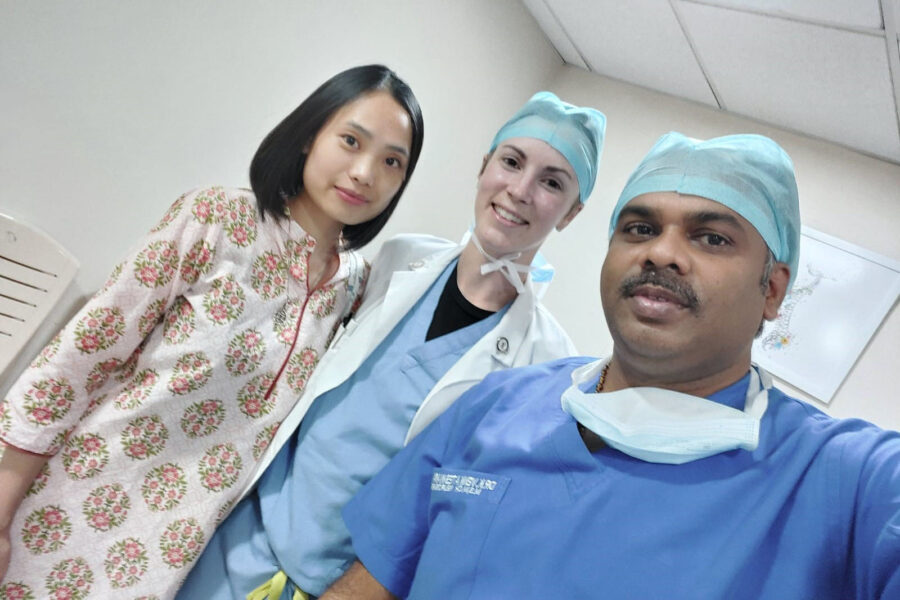Natasha Hongsermeier-Graves did her final residency interview in the company of a giant da Vinci robot.
Hongsermeier-Graves, who will match into her residency with her UNMC College of Medicine classmates on March 17, conducted the interview in a hospital in Hyderabad, India, where she was taking part in a monthlong rotation in global surgery.
She had completed almost all her residency interviews before flying into India on Jan. 25. But with one left to do, she found herself interviewing by Zoom in a surgical suite in the company of her robotic colleague. (In keeping with its minimally invasive nature, the da Vinci robot stayed quiet throughout.)
The interview scheduling was less than convenient, but for Hongsermeier-Graves, who hopes to match into a neurosurgery residency, the opportunity for a month working alongside the surgeons at the Basavatarakam Indo-American Cancer Hospital and Research Institute was too good to pass up.
“I was first-assisting on all the neurosurgery cases,” she said. “And I found wonderful mentors in T. Subramanyeshwar Rao, MBBS, and K. Venkateshwara Rao, MBBS.
Hongsermeier-Graves’ rotation was the result of a 2009 memorandum of understanding between UNMC and the Indian state of Andhra Pradesh. Through this two-way exchange program, overseen by associate dean of graduate medical education Chandra Are, MBBS, UNMC has welcomed almost 900 Indian students in the past 14 years. UNMC students have traveled to India far less frequently – about four surgical residents and 12-15 medical students – but the MOU gives UNMC students access to rotations at more than 50 Indian medical schools. Although the exchange program was very active before, it came to a standstill during the pandemic and is now gradually being ramped up back to its full potential.
Because of Basavatarakam’s cancer focus, Hongsermeier-Graves observed and assisted in many cancer surgeries. And, as she would at UNMC, she followed through with those patients, touching base with them each day throughout their hospital stay. She saw patients in clinic, as well.
Hongsermeier-Graves said the international rotation was eye-opening.
“There are two things I would point to,” she said. “The first is realizing that just because we do things one way at UNMC or even in the United States, there’s probably other ways to do them. Just learning other ways of performing procedures and taking care of patients, especially in areas that may have fewer resources, and learning to be judicious and efficient in the resources that you use, was valuable.
“But also, outside of the medical component, there is immense value in the cultural humility and the cultural experiences, learning a new language – just being in a new setting, a new country, a completely new environment. There’s a lot of opportunity for growth in that.”
Hongsermeier-Graves, who holds an MPH from the Harvard T.H. Chan School of Public Health, said that the opportunity meshed neatly with her public health interests.
“We can learn lessons from other countries and how they do things, and we can try to bring that back to the U.S. and the U.S. health care system,” she said. “It’s no secret that we spend the most on health care of any country in the world and yet don’t have the best outcomes.”
In India, Hongsermeier-Graves found, resources are not always infinite, and practitioners must make good use of resources and keep the cost of care low for underserved patients.
“Those are valuable public health and global surgery lessons to take away,” she said,
Hongsermeier-Graves said the experience was invaluable for a medical student, also noting that she was extremely busy clinically and got to do a lot more than she expected as a student.
“In your practice, no matter where you are, you’re probably going to take care of patients from all over the world, because that is just the reality of the globalized society that we live in,” she said. “If you spend time in another country, learning about another culture, new customs or languages, can help you – help all of us — take care of our patients no matter where we end up in the world.”
